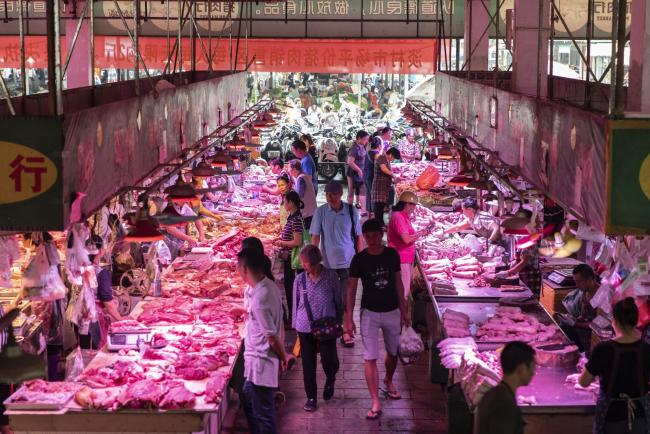(Bloomberg) -- China’s blistering rally in pork prices, which has pushed the country’s inflation to the highest in seven years, may ease by the end of the year as the government takes a raft of measures to rein in run-away costs.
Besides more frequent sales from state reserves and moves to increase imports, China may also force commercial cold storage firms to release their inventories before the traditional Lunar New Year holidays in January, said Jim Huang, head of independent consulting firm www.china-data.com.cn. China is also prepared to lift a ban on U.S. poultry to increase meat supplies.
“We could see prices continuing to rise until the middle of December when the government may intervene,” said Huang. Local governments have been trying to expand inventories by storing one tenth of slaughtered meat over the past few months and these reserves could be released to the market before the holidays, Huang said in a phone interview on Monday.
China, the world’s top pork consumer, will boost imports from Canada after the recent resumption of trade, and allow shipments from more suppliers in Chile and Argentina, helping curb prices, said Zhu Zengyong, a researcher with the Chinese Academy of Agricultural Sciences’ Agricultural Information Institute.
“Prices may rise, but not as much as they did in September and October,” said Zhu, saying farms kept more sows as breeding stock, resulting tighter supply. Farmers, who are raising bigger hogs for fattier meat, will start slaughtering their pigs for the Lunar New Year, which will boost supplies, added Huang.
China’s pork rally has already shown signs of slowing in the first week of November, with prices up 0.7% on a week earlier, compared with a gain of 7.4% in the last week of October and 11% in the seven days before that. Still, prices are up 168% on a year earlier, according to agriculture ministry data.
Pig Deaths on Russian Border Suggest China Outbreak Is Spreading
The resurgence of African swine fever in parts of China, especially the north and northeast, has triggered selling of hogs in some places, pressuring prices, said Lin Guofa, a senior analyst with consulting firm Bric Agriculture Group.
Increased slaughtering before the Lunar New Year holiday will deplete herds and is likely to worsen the pork shortage in the first half of next year, leading to higher prices, before farmers rebuild inventories, said Zhu and Huang.
(Updates to add comment in fourth, fifth and final paragraphs)
To contact Bloomberg News staff for this story: Niu Shuping in Beijing at nshuping@bloomberg.net
To contact the editors responsible for this story: Anna Kitanaka at akitanaka@bloomberg.net, James Poole, Atul Prakash
©2019 Bloomberg L.P.
